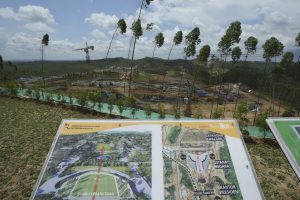The top two officials of the body overseeing the construction of Indonesia’s new capital Nusantara have unexpectedly resigned, government officials said yesterday, casting another pall of uncertainty over President Joko “Jokowi” Widodo’s signature project.
The $33 billion city is currently being carved from the verdant hills of East Kalimantan, some 1,300 kilometers from the current capital Jakarta, which is overcrowded, polluted, and subject to chronic flooding.
According to a report by the Jakarta Globe, State Secretariat Minister Pratikno confirmed to the media that Bambang Susantono, the head of the Nusantara Capital Authority (OIKN), and his deputy Dhony Rahajoe had resigned their posts.
He said that the pair, who were appointed to head up the OIKN in March 2022, had submitted their resignations several weeks ago, but that the presidential decree regarding their dismissal was only issued yesterday. Pratikno announced that the pair would be replaced by Public Works and Public Housing Minister Basuki Hadimuljono and Deputy Minister of Agrarian Affairs and Spatial Planning Raja Juli Antoni, until permanent replacements could be found.
It is not clear what motivated the resignations – Pratikno said that “the reasons were not stated in the resignation letter” – but they come at an uncertain time for the Nusantara project, which Jokowi has envisioned as the most concrete legacy of his decade in office. The city is intended as to avoid Jakarta’s pitfalls, and will “be inclusive, green, and sustainable,” as Bambang puts it in a quote still featured on the OIKN’s website. “The construction of a new city is more than just building its physical features,” he adds in the quote. “It is also about designing it in a way that promotes social cohesion and ensuring its residents live comfortably, fairly, and ideally.”
Perhaps unsurprisingly for such a costly and extensive project, the construction of Nusantara has moved forward at a sluggish pace since its ground breaking in mid-2022, struggling to attract the billions of dollars in private investment that it will require. (The government intends to fund less than a fifth of the cost itself.)
The resignations therefore raise questions about Jokowi’s plans for the city to be sufficiently ready in time for him to host this year’s official independence day celebrations there on August 17. As the Jakarta Post reports, the government plans to relocate a handful of cabinet members to Nusantara as early as July, and is currently building the infrastructure necessary for the relocation of the first batch of civil servants – some 12,000 of them – in September.
The government said late last year that basic infrastructure construction for the new capital was nearly 63 percent complete, and that it was on schedule for completion by the end of 2024. But the planned relocation of civil servants and cabinet members in August has been delayed due to the slow pace of construction.
The government insists that the resignations at OIKN will not affect the project’s progress. “The development of new capital will be continued in line with the shared vision that has been established,” Jokowi said in a post on his official Instagram account yesterday. The Indonesian leader is scheduled to visit Nusantara today to inaugurate several projects, including schools, BenarNews reported.
Addressing the press yesterday, Basuki said that the basic infrastructure was now 80 percent complete, and that “expediting investment and land acquisition” would be his priorities as acting head of the OIKN.
“We will soon decide on the status of the land,” he said, according to Reuters. “Whether we sell it, rent it or if there will be cooperation between government and companies, we will speed it up so that investors won’t have any doubts.”
While President-elect Prabowo Subianto, who takes office in October, has pledged to continue developing the Nusantara project, observers say that the abrupt resignations raise questions about the future of the project, which will require years of sustained effort in order to fulfill, even partially, the government’s ambitious vision. “These resignations will make people question the project,” Arya Fernandes, an analyst at Indonesia’s Centre for Strategic and International Studies told Reuters. “The question is how to convince investors that there is no problem.”
































